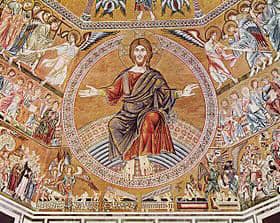 Gospel of 19 May 2020
Gospel of 19 May 2020
Tuesday of the Sixth Week of Easter
John 16:5-11
Unless I go, the Advocate will not come to you
Jesus said to his disciples: ‘Now I am going to the one who sent me. Not one of you has asked, “Where are you going?” Yet you are sad at heart because I have told you this. Still, I must tell you the truth: It is for your own good that I am going because unless I go, the Advocate will not come to you; but if I do go, I will send him to you. And when he comes, he will show the world how wrong it was, about sin, and about who was in the right, and about judgement: about sin: proved by their refusal to believe in me; about who was in the right: proved by my going to the Father and your seeing me no more; about judgement: proved by the prince of this world being already condemned.’
Reflexion
Farewells can be painful for both the person who is leaving and those remaining. This is especially so when it’s someone that you’re especially close to, then saying goodbye can actually be the hardest thing you could ever do. The only time when a farewell is easy and a happy occasion is when you can’t wait to see the other person go. You may even throw a farewell party and name it “good riddance.”
But this second scenario cannot be the experience of the Lord’s disciples. They are saddened by His announcement that He is leaving them and our Lord acknowledges their pain. Our Lord then explains that His farewell is necessary; even an occasion to rejoice. Why is Christ’s physical absence from us, better for us, than his physical presence?
Our Lord explains, “It is for your own good that I am going because unless I go, the Advocate will not come to you; but if I do go, I will send him to you.” If the Lord does not go into the Father’s glory by way of His cross and resurrection, the Holy Spirit will not come to the disciples, for fallen humanity, enslaved to sin, is not capable of receiving Him. After Jesus has been glorified, He is no longer bound by the limits of space and time, and therefore He can be present to the disciples in an infinitely more intimate way through the Spirit, than He ever could be before Easter: Jesus will not just be with them but will also be “in” them. This is why things will be better for the disciples after He has left them physically. His physical absence only means that He is now more spiritually present. There is no loss, just more to be gained!
Yesterday we saw how the Holy Spirit comes to testify to Christ. He comes as a witness. Today our Lord makes the fourth statement or promise about the Holy Spirit. He explains that the Holy Spirit also comes to convict us. He comes as a prosecutor. He comes and admonishes us in three specific areas: sin, righteousness and judgment. So many people refuse to acknowledge that they have sinned. It is so much easier to blame someone else or give excuses for our mistakes. That’s called the sin of self-righteousness. The self righteous often see the sins of others but are blind to their own. Ultimately, judgment is reserved not just for any sinner but for unrepentant sinners, sinners who are convinced of their own righteousness rather than admit that they have sinned. That is why the Holy Spirit comes to convict them.
How does the Holy Spirit do this? The illuminating work of the Holy Spirit may be said to be the groundwork of all His other operations. It is through the revelation of Truth that the Spirit fulfills all the functions of His office in the minds of men. By enlightening the mind, He lays the groundwork for the conviction of conscience. And where there is light, the darkness will be exposed. The Spirit’s work of convicting us is not one which seeks to condemn us but to help us see our own darkness, the darkness of sin. The path to salvation lies in acknowledging our sins, casting aside our self righteousness, and finally throwing ourselves at the mercy of our Judge and King. This is how the Holy Spirit convicts us in order to save us.
By our common Baptism and Confirmation, the Spirit lives in us and prepares the Church to combat fallen humanity’s condition. This inevitably brings to mind the state of the world today. We live in a world that is trapped in sin, but what is worse than being trapped in sin is the refusal to acknowledge the truth of that. And if there is no awareness, no acknowledgement, there can be no repentance, only judgment. Ironically, modern society regards any mention of sin as being judgmental. It’s like saying that the doctor is being mean if he tells you that you are sick. Sin blinds us to the cure!
As Christians, we must not ignore what’s happening in the world for the sake of survival. There is an enormous and dramatic struggle between good and evil taking place in society today, as it has been throughout man’s history. Hence, the importance of our conscience and how we need to share the truth about good and evil with others. We always need to remember that it is the Holy Spirit’s job to convict, God’s job to judge and our job to love. And love demands that we speak the Truth, not to hurt, not to destroy but to free those whom we love from the falsehood of sin.
